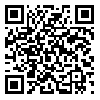BibTeX | RIS | EndNote | Medlars | ProCite | Reference Manager | RefWorks
Send citation to:
URL: http://rjms.iums.ac.ir/article-1-3951-en.html
Background: Apelin is a novel adipokine that is closely related with insulin resistance and type 2 diabetes. The purpose of the study was to determine the effects of progressive resistance training on plasma concentrations of plasma apelin and insulin resistance in middle-aged men with type 2 diabetes.
Methods: twenty seven types 2 diabetic men selected as subjects and were randomly assigned into two exercise (n=15 aged 46.40 ± 3.02 yrs) and control (n=12 aged 45.06 ± 3.86 yrs) groups. Resistance exercise training was done for 8 weeks (3 days/week, intensity: 30- 70% 1RM) for experimental group. Before and after exercise plasma apelin level, insulin,
glucose and insulin resistance (HOMA-IR) after a 12-h fasting was measured. Following the second blood sampling, data analysis was performed and p<0.05 was considered significant.
Results: Finding showed that plasma apelin, insulin levels, HOMA-IR, fasting blood glucose (FBG) have significant changes in the exercise group compared to pre-exercise and control groups (p≤0.05).
Conclusion: It seems that low to moderate intensity resistance exercise training has significant effect on the amount of plasma apelin and insulin resistance in type 2 diabetic men. Apelin level may be effective to improve insulin resistance and glycemic control in type 2 diabetic men.





